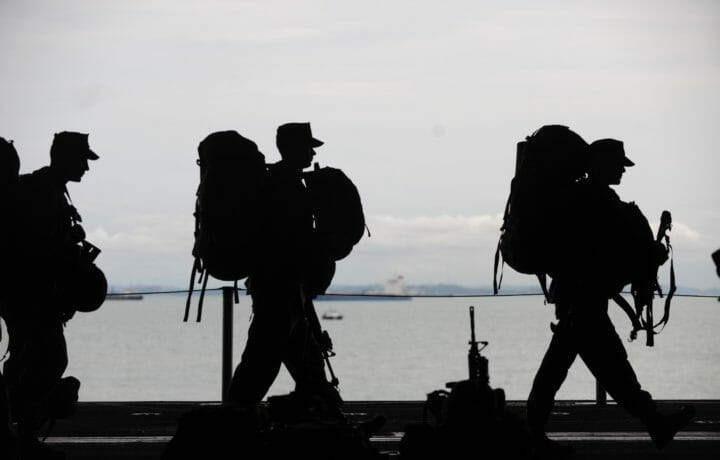In a lawsuit filed last week in the United States District Court, District of Arizona, the plaintiff, Richardo Correa Marquez, sued the Department of Defense seeking injunctive relief by the court for alleged discriminatory practices under the Equal Protection clause of the Fifth Amendment to the United States Constitution.
Before the facts are noted, some law and policy background of the challenged naturalization and commissioning program needs to be shared with the reader. Much of the timeline of policy changes occurred during the 2016-2018 period.
This action challenges unconstitutional national origin discrimination imposed by the U.S. Department of Defense (DoD) and the U.S. Army on naturalized U.S. citizen soldiers who entered the U.S. armed services through the Military Accessions Vital to National Interest (MAVNI) program, thereby delaying and precluding their military careers and preventing them from fully utilizing their talents for the benefit of the national defense.
The Origins of the MAVNI program
The MAVNI program was initially authorized by Secretary of Defense Robert Gates in November 2008, and allowed the U.S. Armed Services to recruit two categories of MAVNI enlistees: (1) Health Care Professionals (HCPs), who were legally present noncitizens with certain U.S. medical licenses or credentials, and (2) language enlistees, who were legally present noncitizens who had demonstrated expertise in certain strategic foreign languages.
Army MAVNI enlistees were required to meet all of the usual requirements for enlistment except that they were required to score higher on the Armed Forces Qualification Test (AFQT) than other military recruits and were ineligible for any “moral” or conduct waivers.
MAVNI recruits were required by their enlistment contracts to apply for naturalization as United States citizens and were advised of this requirement during the enlistment process. Those that became naturalized citizens were able to apply for commissions
The MAVNI program began recruitment in 2009. In 2016, Peter Levine, Acting Undersecretary of Defense for Personnel and Readiness, wrote a memorandum dubbed the “Levine memo,” prohibiting naturalized U.S. citizen MAVNI soldiers from receiving a security clearance during their first term of enlistment (typically 6 to eight years). Defendants expanded this policy on January 6, 2017 to also prohibit U.S. citizen MAVNI soldiers from applying for any position or program that required a security clearance during their first term of enlistment. Defendants, through the “Levine memo,” prohibited naturalized U.S. citizen MAVNI soldiers from receiving a security clearance during their first term of enlistment (typically 6 to eight years). Defendants expanded this policy in 2017 to also prohibit U.S. citizen MAVNI soldiers from applying for any position or program that required a security clearance during their first term of enlistment. In June of 2017, another memorandum from the same office in essence revoked the prior language from 2016 by allowing those in the MAVNI pilot program who had become naturalized U.S. citizens and completed basic training to apply for a security clearance.
This language clearly stated, “Effective immediately, individuals enlisted under the MAVNI Pilot Program who have successfully completed basic military training/boot camp . . . and have become naturalized U.S. citizens based on their military service, may be considered for a security clearance on the same terms, conditions and criteria as any other U.S. citizen”. The law did not recognize the granting of an interim security clearance to the MAVNI candidates, although that policy was relaxed, as well. However, plaintiff asserts, the ability to get a security clearance is still complicated and contradictory in nature, which discriminates against him in gaining a commission as promised by the United States Army. .
Correa Marquez is a native of Panama who graduated from medical school there in the 2008 timeframe. Marquez came to the United States under a J-1 visa for post-graduate medical training in June 2010, and over the course of the next six years completed his residency, a fellowship at the National Institute of Health, and a subsequent research fellowship at the same location. The plaintiff is board certified in three different disciplines of medicine, and according to the complaint, has authored over 45 professional articles. Marquez is licensed to practice medicine in Georgia, Maryland, Rhode Island and Arizona, and since 2017 has worked at the Phoenix VA Medical Center as an endocrinologist. He is also active at the University Of Arizona College Of Medicine as a professor and program director. In 2018 he became a naturalized citizen.
On January 11, 2016, Marquez enlisted in the Army Reserve through the MAVNI program (prior to the Levine memo) as an immigrant Healthcare Professional (HCP) Officer Candidate for a term of 8 years, with six years in the Selected Reserve and two years in the Ready Reserve. Plaintiff asserts that at this time he was told by Army recruiters that he would receive his commission shortly, yet as of the date of this lawsuit he has still not commissioned nor does he have a security clearance. He still holds the rank at which he was originally enlisted in the Army in January 2016, that of E-4. The plaintiff is presently assigned to the 48th Combat Support Hospital (CSH) Ft. Meade, MD, but cannot work as a physician without a commission. In late 2019 Marquez, according to court documents, was finally told that his commissioning was imminent, but to this date has not been commissioned. The injunctive relief that Marquez appears to be asking is for the court to declare the MAVNI program as unconstitutional, as well as granting Marquez a commission, which he has been wrongfully denied due to the fact he is now a naturalized citizen.
It will be intriguing going forward as to what type of evidence the plaintiff can provide to show he was misled by the Army, and how the timeline of all of these changes to the MAVNI policy may or may not have affected him, since most of them happened after he enlisted. Those two important back stories will carry great weight in determining the case outcome.




